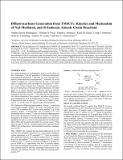Difluorocarbene generation from TMSCF3 : kinetics and mechanism of NaI-mediated and Si-induced anionic chain reactions
Abstract
The mechanism of CF2 transfer from TMSCF3 ( 1 ), mediated by TBAT (2–12 mol %) or by NaI (5–20 mol %), has been investigated by in situ/stopped-flow 19F NMR spectroscopic analysis of the kinetics of alkene difluorocyclopropanation and competing TFE/c-C3F6/homologous perfluoroanion generation, 13C/2H KIEs, LFERs, CF2 transfer efficiency and selectivity, the effect of inhibitors, and density functional theory (DFT) calculations. The reactions evolve with profoundly different kinetics, undergoing autoinhibition (TBAT) or quasi-stochastic autoacceleration (NaI) and cogenerating perfluoroalkene side products. An overarching mechanism involving direct and indirect fluoride transfer from a CF3 anionoid to TMSCF3 ( 1 ) has been elucidated. It allows rationalization of why the NaI-mediated process is more effective for less-reactive alkenes and alkynes, why a large excess of TMSCF3 ( 1 ) is required in all cases, and why slow-addition protocols can be of benefit. Issues relating to exothermicity, toxicity, and scale-up are also noted.
Citation
García-Domínguez , A , West , T H , Primozic , J J , Grant , K M , Johnston , C P , Cumming , G G , Leach , A G & Lloyd-Jones , G C 2020 , ' Difluorocarbene generation from TMSCF 3 : kinetics and mechanism of NaI-mediated and Si-induced anionic chain reactions ' , Journal of the American Chemical Society , vol. 142 , no. 34 , pp. 14649-14663 . https://doi.org/10.1021/jacs.0c06751
Publication
Journal of the American Chemical Society
Status
Peer reviewed
ISSN
0002-7863Type
Journal article
Collections
Items in the St Andrews Research Repository are protected by copyright, with all rights reserved, unless otherwise indicated.

